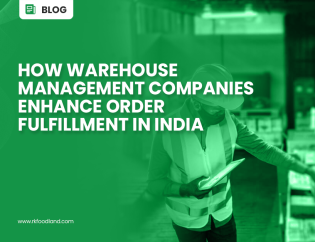
In today’s interconnected and globalized marketplace, ensuring the quality and safety of perishable goods is of utmost importance. Cold chain management plays a crucial role in achieving this objective. Cold chain management refers to the process of maintaining the optimal temperature control of perishable goods throughout the supply chain, from the point of production to consumption. It involves coordinated activities, infrastructure, and stakeholders to ensure the products remain fresh, safe, and high-quality.
Understanding Cold Chain Management
Cold chain management is the systematic approach to managing temperature-sensitive products, such as fresh produce, pharmaceuticals, and perishable food items, from the point of origin to the final destination. It involves maintaining the optimal temperature conditions throughout the supply chain, including storage, transportation, and distribution. With Cold chain management the goal is to prevent any temperature deviations that could compromise the products’ quality, freshness, and safety.
Role of Third-party Logistics Companies
Third-party logistics companies play a vital role in cold chain management. They possess specialized expertise and infrastructure to handle temperature-controlled logistics operations effectively. These companies have access to refrigerated storage facilities, temperature-controlled vehicles, and advanced technology for real-time monitoring and tracking of temperature-sensitive goods. By partnering with 3PL companies, businesses can leverage their resources and capabilities to ensure the seamless execution of cold chain management processes.
The Emergence of Cold Chain Management in Supply Chain Fulfilment
Cold chain management has gained prominence due to several factors. The growing demand for perishable goods in global markets fuels the changing consumer preferences and increases the consumption of fresh produce. Apart from that, consumers have become more conscious of food safety and quality, demanding products that are fresh, safe, and free from contamination. Technological advancements and transportation capabilities have enabled more efficient and reliable temperature control, making cold chain management more feasible and cost-effective. The need for end-to-end fulfillment in supply chain management has emphasized the importance of integrating cold chain management to ensure the smooth flow of perishable goods from suppliers to customers.
How Cold Chain Management Ensures Quality and Safety?
1. Maintaining Optimal Temperatures Control
Proper temperature control is crucial in preserving perishable goods’ quality, freshness, and safety. Cold chain management involves the use of refrigerated storage facilities and temperature-controlled vehicles to maintain the desired temperature range throughout the supply chain. Continuous monitoring and recording of temperature at each stage help promptly identify and address any deviations. Regular preventive maintenance and quality control measures ensure the equipment and facilities function optimally.
2. Ensuring Product Integrity and Quality
Proper handling and packaging are essential to prevent damage and contamination of perishable goods. During storage and transportation, cold chain management minimizes exposure to temperature fluctuations, light, and humidity. Adequate packaging materials and techniques, such as insulated containers and refrigerated containers, are used to safeguard the integrity and quality of the products. Additionally, implementing quality assurance and control processes helps maintain product standards and minimize the risk of quality issues.
3. Managing Shelf Life and Expiry Dates
Effective inventory management is undoubtedly a critical aspect of cold chain management. It involves proper stock rotation using different systems to ensure that products with shorter shelf life are consumed first. Traceability systems track perishable goods’ origin, manufacturing, and expiry dates. This enables the timely removal of expired products from the supply chain, reducing the risk of selling or using expired items.
4. Mitigating Food Safety Risks
Cold chain management prioritizes food safety by adhering to stringent regulations and guidelines. Compliance with food safety standards, such as HACCP, ensures proper hygiene practices are followed during storage, handling, and transportation. Regular inspections, audits, and testing are conducted to identify and mitigate potential risks. This helps in preventing foodborne illnesses are ensuring the safety of consumers.
5. Minimizing Supply Chain Disruptions
Cold chain management incorporates robust contingency plans and risk management strategies to minimize the disruptions occurring in the end-to-end fulfillment of the supply chain. Unforeseen events, such as equipment breakdowns, power outages, or natural disasters, can disrupt the temperature control of perishable goods. By developing contingency plans, businesses can respond quickly and efficiently to such events, minimizing the impact on product quality and delivery timelines. Building strong partnerships with reliable suppliers, carriers, and stakeholders contributes to a more resilient and reliable supply chain.
6. Enhancing Customer Satisfaction
Cold chain management is crucial in meeting customer expectations and enhancing satisfaction. By ensuring that products are delivered fresh, safe, and of high quality, businesses can build trust and reputation among customers. Meeting customer demands, taste, nutritional value, and product freshness contributes to customer loyalty and repeat business.
7. Reducing Food Waste and Losses
Efficient cold chain management practices help minimize food waste and losses. Businesses can reduce spoilage, damage, and product expiration by maintaining optimal temperature control, implementing efficient handling and transportation practices, and optimizing inventory management. This minimizes financial losses and contributes to environmental sustainability by reducing food waste.
Cold chain management is vital for ensuring perishable goods’ quality, safety, and integrity throughout the supply chain. With their expertise, infrastructure, and technology, third-party logistics companies play a crucial role in executing effective cold chain management. Effective cold chain management contributes to businesses’ overall success and competitiveness in the perishable goods industry. Thus, integrating cold chain management in supply chain fulfilment is crucial to meet consumer demands, maintaining brand reputation, and achieving sustainable growth.
Experience the power of seamless cold chain management with RK Foodland, one of the leading cold supply chain companies in India. Ideal for end-to-end fulfilment, RK Foodland leverages expertise in integrated cold chain logistics and help ensure the quality and safety of products from point zero to the destination. With advanced technology, futuristic solutions, and thoughtful strategies, experts at RK Foodland help curate comprehensive cold chain integrated fulfilment solutions catering to the end needs of the business. Trust RK Foodland to deliver excellence in cold chain management and take your perishable goods to new heights.
Contact us for consultation and partner with RK Foodland to unlock the full potential of your business.









